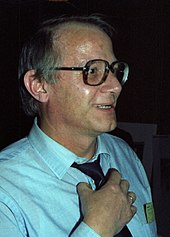Peter Schulz (politician)
Peter Schulz (born April 25, 1930 in Rostock ; † May 17, 2013 in Hamburg ) was a German lawyer and politician ( SPD ). From 1971 to 1974 he was First Mayor of the Free and Hanseatic City of Hamburg.
Life
His father Albert Schulz was Lord Mayor of Rostock from 1945 until his dismissal in 1949 . Peter Schulz graduated from high school in Rostock in 1949. After the family fled from the GDR , he studied law at the University of Hamburg . In 1954 he passed the first and in 1958 the Great State Examination in Law. He was admitted to the bar in 1959. A year later, he and Alfred Phillipp founded what is now the Schulz Noack Bärwinkel law firm with branches in Hamburg, Rostock and Shanghai .
Schulz was married to the doctor Sonja Schulz (née Planeth), with whom he had two children. He died on May 17, 2013 at the age of 83 in a Hamburg hospital from complications from a heart disease and was buried in the Ohlsdorf cemetery in Hamburg.
politics
During his studies, Schulz was the state chairman of the Young Socialists and federal managing director of the Socialist German Student Union . In 1961 he became a member of the Hamburg Parliament . In 1966 he headed the Parliamentary Investigation Committee, which investigated the death of a prisoner in a calming cell in the Hamburg remand prison . Significant omissions and cover-ups by prison authorities and prosecutors were exposed. In 1966 he was elected to the Hamburg Senate and took over the management of the newly structured judicial authority . In 1970 he took over the office of second mayor and switched to the department for schools, youth and vocational training . On June 9, 1971, Schulz was elected First Mayor to succeed Herbert Weichmann . At that time he was the youngest First Mayor since 1678.
With the Green City campaign , he set the first accents in state environmental policy . The radical decree of the Hamburg Senate, which made it possible to reject applicants for the public service if there were doubts about their loyalty to the constitution , also fell during his term of office . His plan to build a new building area for 60,000 people in the Billwerder / Allermöhe area failed due to resistance from the left wing of the party and the coalition partner FDP . Later a much smaller residential area was realized in the same place. After heavy losses in the 1974 state election , Schulz resigned on October 31, 1974. He was succeeded on November 12, 1974 by Hans-Ulrich Klose . Since then Schulz has been working as a lawyer in his law firm again.
In 1978 Schulz was unanimously elected President of the City Council. He held this office with a short break from 1982 to 1986. In 1989/1990 Schulz was a legal advisor to the city government in his home town of Rostock and helped rebuild the SPD there. He later became Honorary Consul of Norway and President of the Lawyers' Disciplinary Court for Mecklenburg-Western Pomerania .
Honors
- 1990: Mayor Stolten Medal from the Hamburg Senate
- 2006: Honorary doctorate from the Philosophical Faculty of the University of Rostock
Publications
- Origins of our freedom. From the American Revolution to the Bonn Basic Law. Hoffmann and Campe, Hamburg 1989, ISBN 3-455-08330-7 .
- A proposal for judicial reform without a chance. In: Helmut Schmidt (Ed.): Explorations. Contributions to the understanding of our world. Minutes of the Friday Society (= Ullstein 36268). Ullstein, Munich 2001, ISBN 3-548-36268-0 .
- Rostock, Hamburg and Shanghai. Memories of a Hamburg mayor. edition Temmen, Bremen 2009, ISBN 978-3-8378-2001-0 .
- Legal development in China. In: Helmut Schmidt (Ed.): Deepening. New contributions to understanding our world. Minutes of the Friday Society. Siedler, Munich 2010, ISBN 978-3-88680-967-7 , pp. 53-66.
Senates
- Senate Schulz I (1971–1974)
- Senate Schulz II (1974)
Web links
- Literature by and about Peter Schulz in the catalog of the German National Library
- Literature about Peter Schulz (politician) in the state bibliography MV
- Schulz, Noack, Bärwinkel law firm
- Death report from the Hamburg Senate
Individual evidence
- ↑ See also Uwe Bahnsen: Who killed the Hamburg prisoner Haase? , in Die Welt on March 12, 2016 (accessed March 29, 2016). Furthermore, Beste Menschen , Der Spiegel , 34/1967 of August 14, 1967 (accessed March 31, 2016).
- ↑ Langenhorner Wochenblatt, edition September 9, 2008, page 8.
- ↑ Langenhorner Wochenblatt, edition September 9, 2008, page 9.
| personal data | |
|---|---|
| SURNAME | Schulz, Peter |
| BRIEF DESCRIPTION | German lawyer and politician (SPD), Member of the Bundestag, Mayor |
| DATE OF BIRTH | April 25, 1930 |
| PLACE OF BIRTH | Rostock |
| DATE OF DEATH | 17th May 2013 |
| Place of death | Hamburg |


